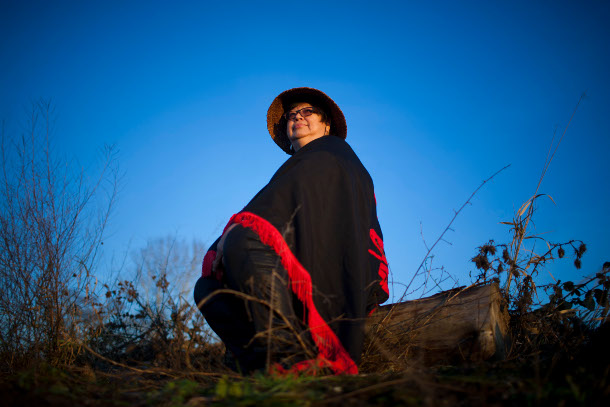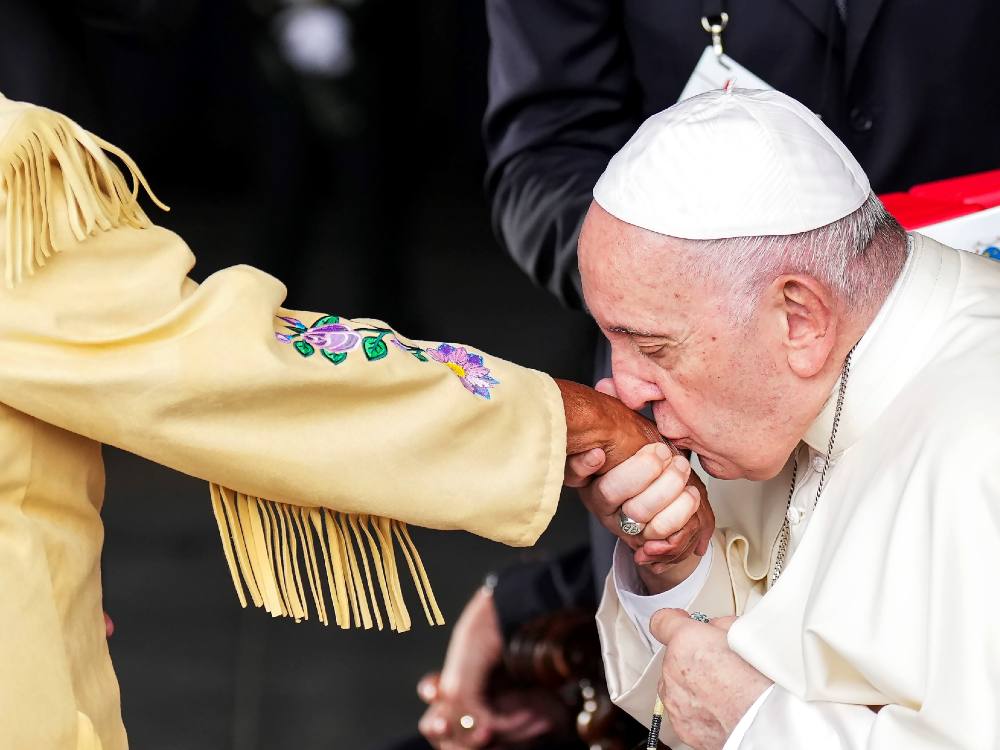Pope Francis, the 266th Bishop of Rome, arrived in Edmonton on Sunday and will be ending his "pilgrimage of penance" in Nunavut on Friday.
He is expected to give an apology for the sexual abuse, neglect and cultural genocide of Indigenous Peoples in the residential school system, run by the Catholic Church (among other sects of Christian churches) and the Canadian government.
For over 150 years, First Nations, Métis and Inuit children were stolen from their families and communities and forced to attend Indian residential schools with the purpose of destroying their Indigenous identity. Indigenous children were severed from their culture through forced assimilation that had devastating, long-lasting effects. Children were forbidden from speaking their languages, even forced to answer to a different name or risk traumatic physical abuse at the hands of the school staff.
The act of forced assimilation was described by Pope Francis himself as “diabolical, it is to kill life and richness.”
Now many Indigenous people are tracking the Pope’s visit with guarded skepticism, waiting to hear if, finally, the leader of the Roman Catholic Church will take clear responsibility for the cultural destruction it waged, renounce centuries-old colonial doctrines issued by past popes, and commit to making material reparations.
That mood is reflected in a message shared with The Tyee by Judith Sayers, president of the Nuu-Chah-nulth Tribal Council. It begins:
“To the Pope:
“I have no interest to see you and hear you in person. I have no need for an apology from you that is meaningless and far too late. Your church has wreaked generational trauma and pain on my family and community.
“How can you hold yourself out as a church of God when long ago you would have admitted your violations to First Nations peoples, apologized and made substantial amends? I have no respect for a church that treated people like you did.
“That being said, I respect the many people who want to see and hear you. I hope every effort is made to ensure that the survivors of residential school who want to see you get that opportunity. It is a critical step in their healing journey…”
In the beginning of western colonization in the 1600s, colonial settlers and missionaries came to the land now known as Canada with the Eurocentric belief that European culture and values were the standard by which all other societies should abide. This view was integral to a series of 15th century decrees called papal bulls claiming the Doctrine of Discovery. The residential school system grew directly out of such racist assumptions.
On May 27 2021, decades after the last residential school closed, Tk’emlúps te Secwépemc Kukpi7 Rosanne Casimir shared with the world the news confirming what they had known all along: the potential remains of 215 children had been found in unmarked graves on a residential school property.
The news from Tk’emlúps te Secwépemc spread like wildfire in the media and soon became an international story of horror, trauma and resilience. Since then, hundreds more likely unmarked human burials have been revealed.
The spotlight cast on stolen lives put pressure on the government and the religious institutions involved in the residential school system, prompting Pope Francis to host Indigenous delegates at the Vatican in May to say words of apology.
The Pope’s apology was an important milestone of healing for some Indigenous people, while some say it didn’t go far enough. Indigenous delegates at the Vatican this spring requested that the Pope visit Canada, as they considered his presence here would be a significant step beyond his words.
Since announcing the Canada visit, the Vatican refused some Indigenous leaders’ requests that the Pope add more stops on his tour, raising questions about the impact of his time here.
Members of the Federation of Sovereign Indigenous Nations expressed in a press release their dismay on Pope Francis’s “Walking Together” tour.
“We had zero consultation on his pilgrimage to ground zero on our own lands,” said FSIN Chief Bobby Cameron. “Many survivors don’t have the agency, money or even technology, to attend the Pope’s visit. It was poorly co-ordinated by Canada and Canadian Conference of Catholic Bishops, who dictate who fits the criteria to attend these short visits, which does not honour survivors.”
Many Indigenous communities are still lacking access to basic necessities of life, demonstrated in 32 long-term boil water advisories in 27 different Indigenous communities.
On APTN News, residential school survivor Chief Ralph Leon Jr. of Sts’ailes Nation said, “We are like a broken people still. This is only one residential school,” he said, gesturing at the institution outside Mission, B.C., where he was a survivor. He noted the widespread impact of the residential school system on Indigenous people across Canada and other systemic harms brought about by government-run programs, reminding, “There’s still the ['60s] Scoop, foster care, day school.”
Christi Belcourt, a Métis artist and activist, has called the papal visit an "erasure tour." She says the lives of Indigenous children are being overshadowed by conversations about the Pope’s visit.
“The only reason why the Pope is coming is to diffuse the energy that was building because of the thousands of children buried beside residential schools,” Belcourt wrote on Facebook.
Belcourt said the delegation’s visit to the Vatican and the news the Pope might visit Canada “immediately... caused divisions in our communities between those who want him to come and those who don’t. Immediately the masses all stopped talking about the children and the crimes of genocide and started talking about the Pope. Immediately the heat was taken off the federal government and it became about the trip to the Vatican.”

Phil Fontaine, the former National Chief of the Assembly of First Nations and a survivor of residential schools, travelled with the delegation of Indigenous representatives to the Vatican, who listened to the Pope’s words of regret on April 1. Fontaine said that he believes in forgiveness and is optimistic about the papal visit, though he is unsure if the Pope will go as far as to rescind the Doctrine of Discovery — the original tenet of colonization.
“The Doctrine of Discovery is embedded in the U.S. judicial system as it is in Canada. And I don't know if he alone would be able to say, ‘I rescind the papal bulls and the Doctrine of Discovery.’ You would have to engage with the governments of the United States and Canada to be able to do that. My own personal view is that he would go there.” Fontaine said on the CBC Podcast The Current.
As the Pope carries out his visit, the varying responses from Indigenous Peoples across the country draw attention to complexities of healing intergenerational trauma. Indigenous identity is not a monolith and each community is built with unique traditions, stories and experiences. For many, the $35-million papal tour has raised “great expectations,” as Nuu-Chah-Nulth Tribal Council president Sayers notes.
In the concluding part her message to the Pope, shared with The Tyee, she makes the stakes plain:
“You must sincerely and from the depths of your heart make an apology for the physical, mental and emotional abuses, mistreatment and degradations of our people while in residential schools run by your church.
“An apology has to be for all, not just done in Rome with a few people listening. You must touch the souls of every person who needs that apology. People have waited lifetimes for this apology and to not do so in the territories of the First Nations would be an even greater insult and lack of respect for people who have suffered unbelievably at the hands of the church.
“There are great expectations of your visit and I ask that you not let our people down by not making an apology and making things right.
“We look to future generations who will build a healthy future free of the impacts of residential schools. This dark history will never be forgotten and we have healing still to do. You can help build this healthy future or isolate yourself from our people. Just remember that you will not bring our Nations down, we do not give you that power.” ![]()
Read more: Indigenous, Rights + Justice
















Tyee Commenting Guidelines
Comments that violate guidelines risk being deleted, and violations may result in a temporary or permanent user ban. Maintain the spirit of good conversation to stay in the discussion.
*Please note The Tyee is not a forum for spreading misinformation about COVID-19, denying its existence or minimizing its risk to public health.
Do:
Do not: